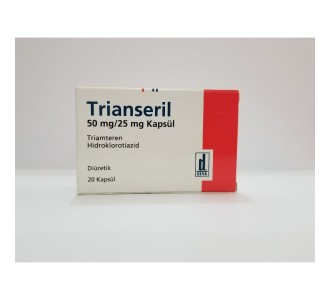Diuretics
Buy Diuretics on domestic-supply.com
Our diuretics are specially formulated to help flush excess water and salts from the body, making them an essential tool for anyone looking to reduce bloating and water retention. Whether you're trying to shed a few pounds or simply looking to feel lighter and more comfortable in your own skin, our diuretics can help you achieve your goals. Made with high-quality ingredients, our diuretics are safe and effective for daily use. Say goodbye to that puffy feeling and hello to a slimmer, more defined physique with our powerful diuretic formula. Trust our diuretics to help you look and feel your best, no matter what your health and wellness goals may be.
FAQs for Diuretics
-
What are diuretics and how do they work? Diuretics, commonly known as water pills, are medications that promote the production of urine. They work by assisting the kidneys in excreting excess salt and water from the body. This is typically achieved by altering the sodium balance in the kidney nephrons, leading to increased urine production. Diuretics are used to manage fluid balance in various medical conditions such as hypertension, heart failure, kidney disorders, and edema.
-
Types of diuretics available in the market. There are several types of diuretics available, each working in a slightly different way, and they are often classified as follows:
- Loop diuretics (e.g., furosemide, bumetanide): Act on the Loop of Henle in the kidney to prevent sodium reabsorption, leading to significant diuresis.
- Thiazide diuretics (e.g., hydrochlorothiazide): Often used to treat high blood pressure; they act on the distal convoluted tubule to increase urine output.
- Potassium-sparing diuretics (e.g., spironolactone, amiloride): Cause diuresis without promoting the excretion of potassium.
- Osmotic diuretics (e.g., mannitol): Increase urine production by creating an osmotic force within the kidney tubules.
- Carbonic anhydrase inhibitors (e.g., acetazolamide): A weaker form of diuretics that are not commonly used for diuresis but rather for glaucoma and altitude sickness.
-
Benefits and side effects of using diuretics. Benefits of diuretics include reducing blood pressure, decreasing edema (swelling) in conditions like heart failure, and managing fluid retention. However, they can also have side effects such as dehydration, electrolyte imbalances (like low sodium or potassium levels), increased urination, dizziness, gout, and in some cases, kidney dysfunction or changes in blood sugar levels. Long-term or unsupervised use can exacerbate these side effects.
-
Recommended dosage and usage guidelines. Dosage and usage guidelines for diuretics vary widely based on the type of diuretic, the condition being treated, and individual patient factors. It is essential to use diuretics as prescribed by a healthcare provider. Dosages may be adjusted based on the patient's response and any side effects experienced. Diuretics are typically taken with or without food, and often earlier in the day to avoid disrupting sleep with nighttime urination.
-
Best diuretic products for specific needs such as bloating, water retention, etc. The "best" diuretic can depend on the underlying cause of bloating or water retention. For example, mild water retention might be managed with a low-dose thiazide diuretic, while more severe fluid overload in heart failure could need a loop diuretic. Potassium-sparing diuretics may be preferred in patients who are at risk of hypokalemia. Over-the-counter diuretic supplements are also available and may contain ingredients like dandelion or green tea; however, their efficacy and safety aren't always backed by substantial clinical evidence, so they should be used cautiously and ideally under medical supervision.
Product reviews for Diuretics
Review 1:
Name: Laura Simmons
Rating: 4.7"I have been using diuretics for a while now to help with bloating, and I must say, the results have been fantastic. These supplements have really helped me shed excess water weight without causing any discomfort. The instructions on the dosage were clear, and I had no issues incorporating them into my daily routine. Overall, I am very pleased with the effectiveness of this product."
Review 2:
Name: Thomas Richards
Rating: 4.5"After researching different types of diuretics, I decided to try this product for managing water retention, and I am glad I did. The ingredients are all-natural, which was a significant factor for me, and they worked gently but effectively to reduce the bloating I was experiencing. The information provided regarding the benefits and potential side effects was thorough and helped me make an informed decision about using this product."
Review 3:
Name: Emily Clark
Rating: 4.8"I was looking for a diuretic to help me before an upcoming event, and this product exceeded my expectations. It helped me achieve a more defined look by reducing water weight without causing any negative side effects. The recommended dosage was easy to follow, and I appreciated the fast results. I would highly recommend this to anyone looking for a reliable diuretic option."
Review 4:
Name: Michael Johnson
Rating: 4.6"Having tried various diuretics in the past, I can confidently say that this product stands out for its effectiveness and affordability. The different types of diuretics available online can be overwhelming, so I appreciated the detailed information provided by this brand. The results were noticeable within a short period, and I experienced no adverse reactions while using this supplement."
Review 5:
Name: Sarah King
Rating: 4.4"As someone who suffers from occasional water retention, finding a trustworthy diuretic was crucial for me. This product provided the relief I was looking for without any harsh side effects. The overall experience of using this diuretic was positive, and I would definitely consider repurchasing it."
Diuretics (Water Pills)
Commonly known as "water pills," these drugs help your kidneys get rid of extra water and salt from your body through your pee. Because you have less total fluid in your blood vessels, like a garden hose that's not turned on all the way, the pressure inside will be lower. This also makes it easier for your heart to pump.
They're usually the first type of medication that your doctor will try to control your blood pressure.
Drug Names:
You'll often start with a thiazide diuretic:
- Chlorthalidone (Hygroton);
- Chlorothiazide (Diuril);
- Hydrochlorothiazide or HCTZ (Esidrix, Hydrodiuril, Microzide);
- Indapamide (Lozol);
- Metolazone (Mykrox, Zaroxolyn).
Take note of that word: prescribed. Water pills are meant to help reduce blood pressure, prevent fluid buildup, and reduce swelling respectively.
They're usually given to people with health issues like hypertension, heart failure, and idiopathic edema (unexplained swelling)—not people looking to cure mild bloating or lose weight. Most doctors recommend against using water pills for those purposes.
Side effects of diuretics
When taken as prescribed, diuretics are generally well tolerated. However, they can still cause some side effects.
More common side effects
The more common side effects of diuretics include:
- too little potassium in the blood
- too much potassium in the blood (for potassium-sparing diuretics only)
- low sodium levels
- headache
- dizziness
- thirst
- increased blood sugar
- muscle cramps
- increased cholesterol
- skin rash
- gout
- diarrhea
Serious side effects
In rare cases, diuretics may cause serious side effects. These can include:
- allergic reaction
- kidney failure
- irregular heartbeat
Warnings and Precautions
Don't take diuretics if you have trouble urinating, or if you're allergic to the active or inactive ingredients found in the medication.
How should I take my diuretic?
Always follow the instructions on the label. These medicines are usually taken in the morning. If you have been asked to take them twice a day take the second dose early in the afternoon. Avoid taking them at night otherwise you may have to wake up to go to the toilet. Don’t alter the amount of fluid that you normally drink while taking this medicine (a normal amount is approximately 2.5 to 3.5 pints of fluid per day, or 1.5 to 2 litres per day).
Can I take other medicines while taking diuretics?
Yes, but some other medicines may affect how diuretics work. It is important that you check with your doctor or pharmacist before taking any other medicines including ones that you buy over the counter. Avoid buying salt substitutes instead of ordinary table salt.
Tips for taking diuretics
- Because diuretics cause you to pass urine more often, it is best taken in the morning. Some people may need a second dose at lunchtime.
- Get to know how long it takes for your diuretic tablet to work after you have taken it, then you can plan your day around it. If you want to go out in the morning and don't want to have to find a toilet, you can delay taking your dose until lunchtime or early afternoon. Avoid taking your dose within 4 hours of your bedtime to prevent having to get up to urinate.
- If you are taking your diuretic for heart failure, the best way to know if it is working is to weigh yourself at the same time each day. Read more about medicines for heart failure.
- Limit or avoid drinking alcohol while you are taking your diuretic. Alcohol may increase your chances of getting side effects such as dizziness.
- Some people taking a diuretic may need to have regular blood and urine tests to check potassium and blood glucose levels. This is to make sure that all the chemicals in your blood stream are properly balanced.


